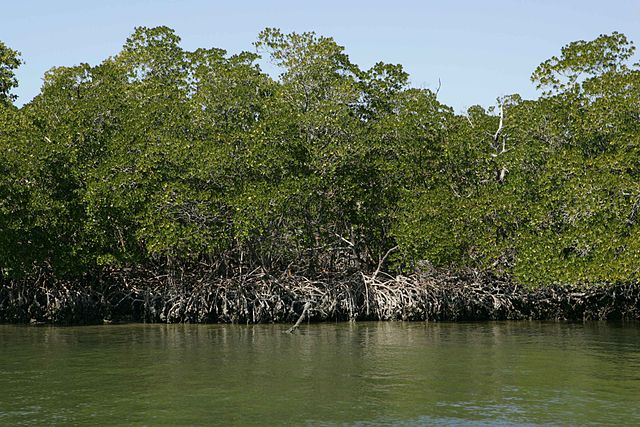In the village of Bendougou, about 20 kilometres west of Dédougou in Burkina Faso, 100 fruit trees stretch 500 metres along the banks of the Mouhoun River. Somwaoga François Zida is the owner of the orchard. This morning, he cut branches that had broken during strong winds the day before during the first rainfall. His bright face reflects his joy.
He planted the trees to prevent the soil from washing into the river. Mr. Zida says that, thanks to the Mouhoun Water Agency’s awareness campaign, he noticed that ploughing his field contributed to the silting of the river. He says, “Rainwater was washing the ploughed soil into the river, so I planted citrus and other thorny trees.”
Mr. Zida no longer ploughs his land after planting the trees. As a result, the soil has remained in place and is covered by trees and grasses. Wind and rainwater no longer transport soil into the river.
The trees are planted from 40 metres to about 100 metres from the water’s edge. Mr. Zida planted his trees in lines parallel to the river, staggered to slow down the flow of rainwater. The trees are about 10 metres apart, as are the lines. In addition, he says, “All along the edge of my field, I planted thorny Acacia nilotica trees that serve as a living hedge.”
Relieved, Mr. Zida explains, “The Mouhoun Water Agency was a great help, alerting us to the situation in the river, providing the plants, and showing us how to plant.”
Amadé Zongo is a geologist at the Mouhoun Water Agency’s Water and Environment Department. He is concerned that poor farming practices are causing the silting of the river. He says, “I wonder if there will still be water in the river in years to come. Just after the rainy season, water in the river is scarce because of the sand.”
Mr. Zongo believes that agricultural practices along the banks of the river and in the watershed are responsible for the silting and polluting of the water. He says that, by using fertilizers and herbicides in their fields, farmers are inadvertently contributing to the growth of invasive plants in water bodies. Furthermore, herbicides pollute groundwater and surface water. He advises farmers and locals to plant trees near watercourses to prevent silting and pollution.
The Mouhoun River is Burkina Faso’s largest watercourse, nearly 1,000 kilometres long, and the Mouhoun river basin is about 100,000 square kilometres. But the silting of the river threatens the river ecosystem and causes flooding during high water. For this reason, the Mouhoun Water Agency is raising awareness among communities about the maintenance of vegetative buffers to protect the river.
Mr. Zongo is pleased that the community’s attitudes are changing. He says: “Since farmers like Mr. Zida started planting trees and stopped disturbing the soil [near the river], the banks were stabilized and the river is no longer silting up.”
Mr. Zida is already starting to enjoy the fruits of his labour. This year, his mango, tangelo, cashew, and a few baobab trees have started producing, earning him more than 200,000 CFA francs ($329 US).
—-
This story was published in Barza Wire, an online news publication of Farm Radio International. Find more stories about farmers and rural communities here. You will also find many more stories about Nature-based climate solutions. https://wire.farmradio.fm/

